|
|
|
Sort Order |
|
|
|
Items / Page
|
|
|
|
|
|
|
| Srl | Item |
| 1 |
ID:
178635
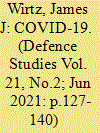

|
|
|
|
|
| Summary/Abstract |
This article offers strategic observations about the ongoing COVID-19 pandemic. It assesses whether the disease outbreak represents an intelligence failure. It describes how the global response to COVID-19 is an example of the so-called “spiral model” in action, whereby policy deliberations are overtaken by events. The analysis also assess how recent experience casts new light on assumptions common to the literature on biological weapons. It addresses the possibility that COVID-19 could spark a rise in cosmopolitan attitudes globally and offers reservations about using the COVID-19 experience as a future template for global pandemic response.
|
|
|
|
|
|
|
|
|
|
|
|
|
|
|
|
| 2 |
ID:
178638
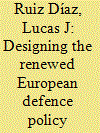

|
|
|
|
|
| Summary/Abstract |
As the COVID-19 crisis has evidenced, Europe is currently facing non-traditional, hybrid threats and challenges to its public order and security that question traditional, stand-alone responses. Conscious of this, during the last decade the European Union (EU) has developed several tools to deal with those security threats and challenges jointly by making full use of the Lisbon Treaty provisions. Indeed, in addition to the strengthening of the policies and instruments of the Area of Freedom, Security and Justice (AFSJ), the EU has particularly boosted European defence cooperation within the framework of the Common Foreign and Security Policy (CFSP) since 2016 through initiatives such as the Permanent Structured Cooperation (PeSCo). The aim of these defence initiatives is twofold: on the one hand, to complement AFSJ instruments to protect the EU homeland and its citizens; on the other, to enhance its response to international crises and contribute to international peace and security. A matter of future concern will be, nevertheless, to sustain the political momentum after the COVID-19 socioeconomic crisis and to show the positive externalities of enhancing defence cooperation in fighting non-traditional threats and challenges, notwithstanding the many difficulties that it will encounter in its uncertain path.
|
|
|
|
|
|
|
|
|
|
|
|
|
|
|
|
| 3 |
ID:
178640
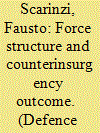

|
|
|
|
|
| Summary/Abstract |
This article examines the Cyprus Emergency (1955–1959) to test the force structure thesis. According to the thesis, armies that deploy more manpower per armored vehicle would succeed in counterinsurgency because they could win people’s trust, secure intelligence from civilians, and use force selectively. Using the congruence method of within-case analysis, I show that the causal process and logic of the force structure argument are not confirmed in the favorable case of Cyprus. Despite its preference for infantry and police units, the British garrison failed to win over the people and persuade civilians to share information about the insurgent; besides, Britain’s intelligence breakthroughs and selective violence did not result from the logic of the force structure thesis, nor did the conflict end as the argument would predict. Political conditions, instead, played a greater role. Ultimately, the case of Cyprus warns against the reassuring belief, inherent in the force structure thesis, that military organizational adjustments in favor of manpower can pave the way to victory against irregular opponents.
|
|
|
|
|
|
|
|
|
|
|
|
|
|
|
|
| 4 |
ID:
178637


|
|
|
|
|
| Summary/Abstract |
“Global Britain” has become the framing concept for post-Brexit foreign policy pursued by successive Conservative prime ministers. Despite exaggerated rhetoric to the contrary, this has not led to a significant shift in Britain’s Gulf strategy, but rather intensified the pursuit of the existing network of bilateral relationships underpinned by security cooperation, defence exports and inward investment. A modest uplift of UK military presence in the Gulf has not demonstrably increased UK influence in the region or over the regional decisions of the Trump administration. This leaves the UK more exposed to risk from deteriorating relations between the US and Iran. It also highlights the delicate balance between Britain’s increasing focus on pursuing domestic economic objectives and its modest defence, diplomatic and security contribution to stability in the Gulf. As Saudi Arabia and the UAE pursue increasingly active and independent regional policies, the UK must reappraise commitments implicit in its interdependent trade- and security-focused strategy to prepare for the possibility of difficult choices, both between allies and about the nature of UK involvement in future regional conflicts.
|
|
|
|
|
|
|
|
|
|
|
|
|
|
|
|
| 5 |
ID:
178641
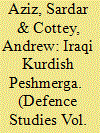

|
|
|
|
|
| Summary/Abstract |
During the war against Islamic State from 2014 to 2017 the Iraqi Kurdish Peshmerga became important local allies of the United States and its international partners, playing a significant role in the eventual defeat of Islamic State. In 2017, backed by the US and its Western allies, the Kurdistan Regional Government (KRG) agreed plans to reform and modernize the Peshmerga. This article provides an analysis of this reform process. Reform is severely constrained by two problems. First, the continuing soft civil war between Iraqi Kurdistan’s two main political parties, the Kurdish Democratic Party (KDP) and the Patriotic Union of Kurdistan (PUK), within which both parties view their maintenance of independent Peshmerga forces as central to their power and political survival. Second, the heroic-mythic status of the Peshmerga within Iraqi Kurdish society, which makes it difficult to convert the Peshmerga into a “normal” military force. Reform efforts to date have not addressed these issues. Until such time as the deep political divide between the KDP and the PUK is addressed, Peshmerga reform is unlikely to make significant progress – the military cart cannot be put before the political horse.
|
|
|
|
|
|
|
|
|
|
|
|
|
|
|
|
| 6 |
ID:
178639
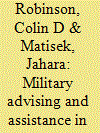

|
|
|
|
|
| Summary/Abstract |
Southern Somalia has attracted substantial military aid and assistance for decades. As the state disintegrated in the late 1980s, clan dynamics became more critical, warlords emerged, and power bases shifted. Since 2008, the number of foreign military forces and advisors (including private military contractors) has substantially increased, as has the creation of numerous Somali security units. Such actions are symptomatic of broader trends concerning multilateral attempts to rebuild security forces in fractious states, where security assistance activities lack unity or common national interests. This has resulted in various Somali military forces with different loyalties (domestic and international), capabilities, and priorities in each Federal Member State (FMS). Uneven foreign military training programs in the context of survival politics fuels the fragmentation of various security forces. Locally appropriate military forces in each FMS potentially appear to be more effective at resisting Al-Shabaab. However, locally appropriate military forces contribute to further fragmentation, as security donors bypass the Federal Government of Somalia (FGS) to directly assist these localized forces. This accelerates devolution of military forces outside of FGS control. These assessments are based on fieldwork and interviews with security officials in East Africa.
|
|
|
|
|
|
|
|
|
|
|
|
|
|
|
|
| 7 |
ID:
178642
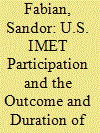

|
|
|
|
|
| Summary/Abstract |
The United States has provides international military education and training (U.S. IMET) to military personnel from more than 100 countries annually. In spite of this, the effects of such training have received limited study in international relations literature. This article explores how these programmes affect the outcome and duration of insurgencies. It theorises that military education and training received in the U.S. improves the human capital of recipient state militaries. This improvement makes the overall military forces of incumbent governments more capable and effective in their fights against insurgents, leading to increased probabilities of government victories. This analysis also argues that improvement in incumbent governments’ military capabilities incentivizes insurgents to disperse, hide, and not engage government forces in open battles, resulting in prolonged conflicts. The statistical analysis of a new, merged dataset including detailed information on insurgencies and U.S. IMET participation between 1976 and 2003 supports both arguments.
|
|
|
|
|
|
|
|
|
|
|
|
|
|
|
|
|
|
|
|
|